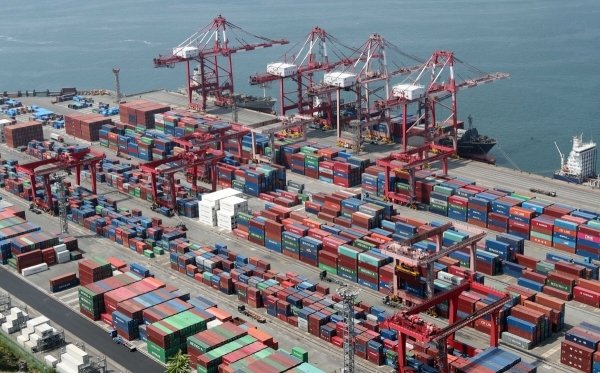 |
(Yonhap) |
South Korea's current account surplus with the United States and China sharply narrowed in 2019 from a year earlier amid a prolonged trade dispute between the world's largest economies that undermined its exports, as well as its current account balance, central bank data showed Friday.
South Korea posted a current account surplus of $22.05 billion with the United States in 2019, compared with a $24.67 billion surplus posted in 2018, according to the data from the Bank of Korea (BOK).
Its current account surplus with China nearly halved to $25.24 billion last year from $47.37 billion the previous year.
Such sharp drops were largely blamed on sharp declines in shipments to the countries, which are South Korea's largest trading partners.
"The country's service account balance and primary income balance with the United States improved on increased tourism income and returns on overseas investment, but its goods account surplus narrowed due to a drop in exports of telecommunication devices and semiconductors," the BOK said.
South Korea had posted an on-year drop in exports in every month of 2019 amid the prolonged trade row between Washington and Beijing.
Its exports snapped a 14-month losing streak in February, one month after the two countries signed an initial trade agreement.
The BOK earlier said the country's overall current account surplus came to $59.97 billion in 2019, down 22.6 percent from a $77.47 billion surplus the year before.
While its current account surplus with the US and China narrowed, its deficit with Japan and Europe also narrowed.
The country's current account deficit with Japan came to $18.82 billion last year, down from $24.7 billion in 2018.
South Korea's imports of Japanese products plunged after Tokyo placed restrictions on South Korea-bound shipments of materials used to produce semiconductors and display panels, both key export items of South Korea.
Japan also removed South Korea from its list of trusted trade partners, further complicating the process of shipping other goods to South Korea and prompting a public uproar here that eventually led to a nationwide voluntary boycott of anything Japanese.
South Korea views the Japanese moves as retaliation against a South Korean court ruling ordering a Japanese firm to compensate South Korean victims of forced labor during Japan's 1910-45 colonial rule of the Korean Peninsula.
In 2019, the number of South Korean visitors to Japan plunged 25.9 percent on-year, while the overall number of South Koreans going abroad gained 0.1 percent, the BOK said earlier.
The country's trade deficit with Europe narrowed to $6.09 billion last year from $9.99 billion in 2018, largely due to a drop in its imports of crude oil and semiconductor production equipment from the region, it said. (Yonhap)





![[Exclusive] Hyundai Mobis eyes closer ties with BYD](http://res.heraldm.com/phpwas/restmb_idxmake.php?idx=644&simg=/content/image/2024/11/25/20241125050044_0.jpg)
![[Herald Review] 'Gangnam B-Side' combines social realism with masterful suspense, performance](http://res.heraldm.com/phpwas/restmb_idxmake.php?idx=644&simg=/content/image/2024/11/25/20241125050072_0.jpg)

